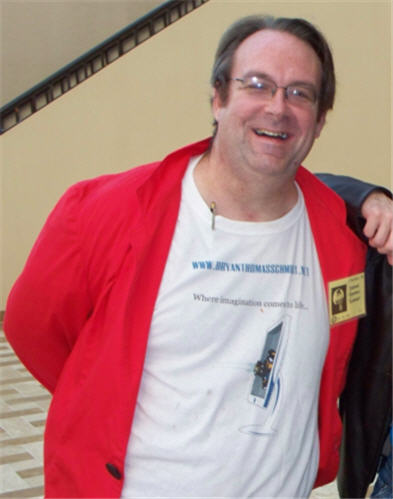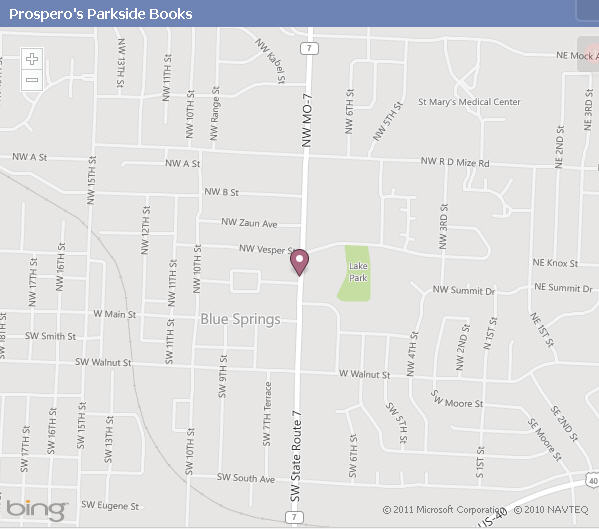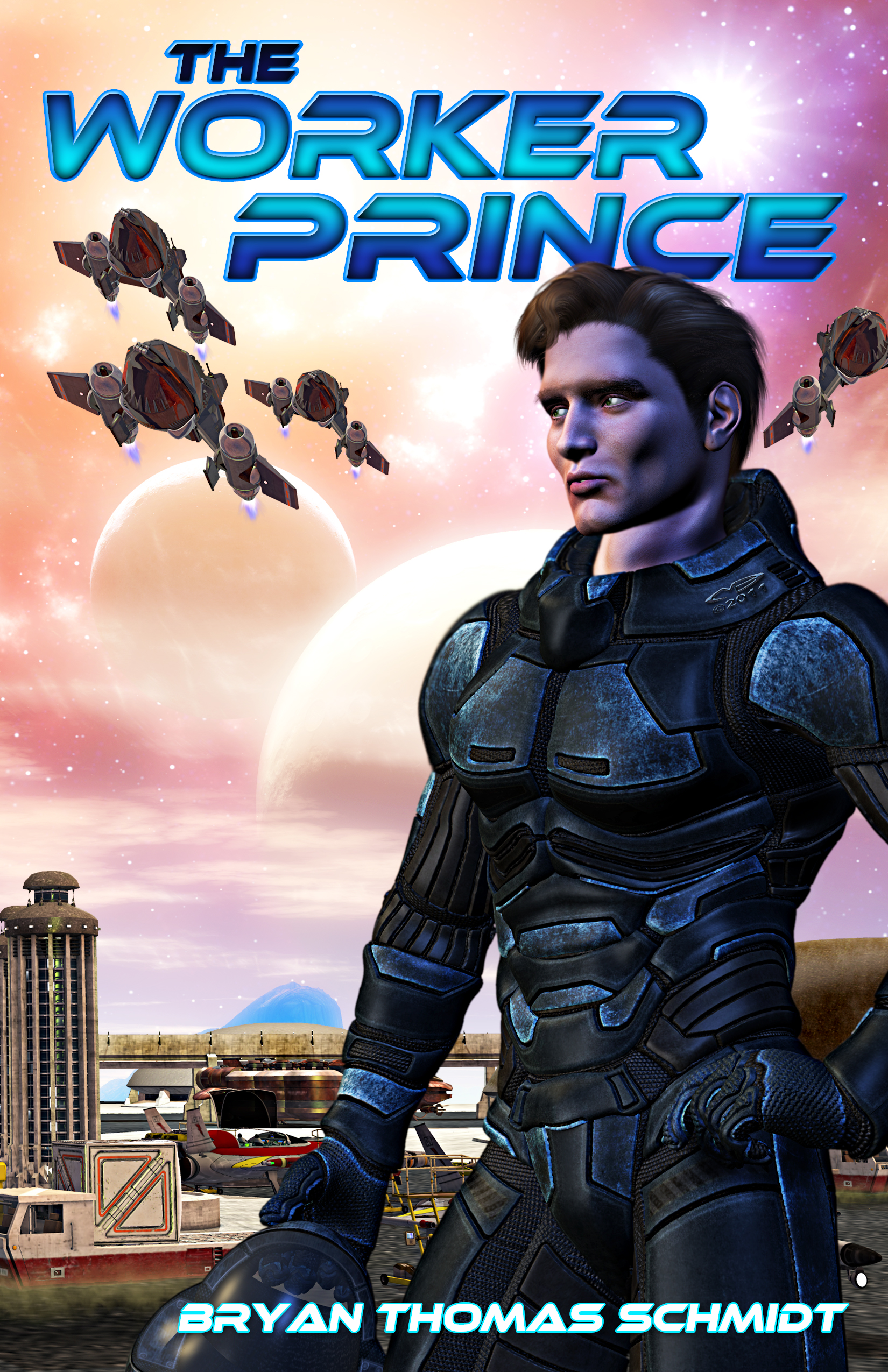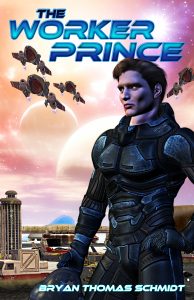




Right off the bat, here are some ways you can put Sell Sheets to work:
1) Market To Bookstores — When given to bookstores and libraries, Sell Sheets help get your books on their shelves. That’s their purpose. And by creating one for each book and describing the book in context of your qualifications and publishing experience, you are selling yourself along with your book. It’s about credibility. And professional marketing materials add a lot to credibility. Every bookstore that I approached with Sell Sheet in hand was willing to discuss ordering my books and doing signings. I have yet to encounter one who didn’t take me seriously after seeing my Sell Sheet for The Worker Prince. They knew I was professional and taking it seriously and those are the kind of authors they want to do business with.
Adonna spoke with a bookstore manager to get an opinion from the other side of the counter for us. “According to a large independent bookstore manager that I interviewed for this post, he felt that the sell sheet gave him something in hand to refer to later when he had the time to consider whether or not to carry the book. Remember, the employees can be busy doing any number of things when you walk in and may not have half an hour to discuss your title with you. *You*, however, came prepared because you have in hand the very thing they will need later when making their purchase decisions – all of the information about your title on a neat and handy little paper. The manager stated that the first two things he looks for are the book’s cover (attractive? appealing? sellable?) and if the book would be available through his current book distributors (Ingram, etc.). Overall, he felt that unknown books that had a sell sheet with all of the pertinent information on it received more consideration than ones that did not.”
2) Market To Libraries — As mentioned by Librarian John Klima in our write tip on How To Get Your Book Noticed By Librarians Or Not, getting a library to buy your books is tough. Sell Sheets are a great tool to make them aware of your books value for them and their community. They’re something you can give to them as you stop by to introduce yourself and offer to do events if they ever need local authors. And something you can leave behind to remind them when they’re thinking about making the next book order. Remember, don’t hand them the book itself. Don’t ask them to evaluate it on the spot. As John told us, if you make them aware of the reviews and other information in a non-pressure way, it’s much more effective. Your word isn’t enough. Your being nice isn’t either. And it’s even better if you can do it at a ALA meeting or outside the library. Because they get way too many authors walking in trying to get libraries to stock their books already and most of them are crap. Don’t throw on the sales pitch either. Talk to them like a person. Relate to them. Share their love of books. Find out what they like in books. Find out what they like in having authors visit the library. But be subtle. Not pushy.
3) Increase Author Appearances — You can use Sell Sheets to get more opportunities for readings, book signings, lectures and other author appearances. Sell Sheets can showcase your qualifications and experiences to conference planners, event organizers, stores and media and that gets you noticed when those people are looking for speakers and presenters. Make sure that if you are available for those that you explicitly say so on the sheet and remember to put your direct contact info.
According to Adonna, “Go ahead and ask the bookstore manager when you talk with them about your book (with sell sheets and a copy of the book in hand of course) if they currently allow book signings in their store. Find out what requirements they have for those and how far out they are booked up. If they do let you have a signing, expect to help promote it in within your community and on local event calendars and such. In any case, make sure that you leave a copy of your sell sheet behind with the employee that you spoke with.”
4) Sell More Books To Readers – Many authors attend fan cons, book conventions and author events every year but what do you do when the people that are passing by your table aren’t ready (for whatever reason) to buy your book at that time? Adonna suggests: “Hand them your sell sheet while you tell them about it. Flip it over and write something on it that relates to what they have discussed with you (perhaps another book or con that you’ve recommended, the name of a section on your website they may be interested in, etc..) People have a tendency to hang on to things that have human (that’s you) writing on them. See there? Your autograph is good for something important already!”
Note: Take the time to reformat your sell sheet beforehand to remove book distributors, etc. as this wouldn’t apply to marketing directly to readers.
5) Sell Products and Services — If you’re not just an author but an editor or teacher, etc., Sell Sheets are quite cost effective ways to get the word out. You can print them as you need them, customize them for specific markets/audiences, and you can distribute them across a broad base by carrying them with you wherever you go.
6) To Inform The Media — Adonna had some advice for us here. “If you do approach the media regarding your title, a copy of your sell sheet is a great thing to send to them along with a handwritten thank you note for taking the time to speak with you. It will help them to remember your title and more importantly – YOU – for the next time that you are in touch with them. Never underestimate the power of reaching out the old fashioned way, especially in the digital age.”
Additional Tips:
** Book Sell Sheets are best delivered by hand. YOU are part of what helps to sell a buyer on an unknown book: your very own sales force and book cheerleader.
** Try posting them on bulletin boards on college campuses. College students read a lot and if the book looks appealing, they might just pick one up, especially if you modify your Sell Sheet to let them know where to find it.
So get those Book Sell Sheets together and let people know about them. Good luck! We hope these tips were helpful. Big thanks to Adonna Pruette for her help and advice and be sure and remember to check out her special offer below. And please post links to your finished Sell Sheets in the comments so we can all learn from you and see how you did, ok? For what it’s worth…
Exclusive Offer:
Adonna has agreed to a special offer exclusively for the visitors here.
PR Quick Check $35 – Adonna will check your current sell sheet offering general guidelines as well as give you tips for how to revise and improve it yourself to increase it’s marketing value for bookstores.
PR Sell Sheet Review – If your sheet needs more than just a few tips, she can fix it up for you for a range from $50 – $150 depending on how much work is needed. You will be given a quote before any work is completed.
Custom Book Sell Sheet – Created for your book from scratch for $200 (which is $100 off of the normal fee for this type of detailed service). Contact her at [email protected] to get started. From DIY help to full service PR, there’s something for everyone in there. You must mention this site in your email to her to get these discounts! Enjoy!
Adonna Pruette is a freelance professional publicist that works with fiction authors and publishers to create digital PR as well as traditional media outreach. Her clients range from well known writers like urban fantasy author Faith Hunter (www.faithhunter.net) to debut authors such as Lillian Archer (Twitter: @LilliansBooks). Her online home at TheAuthorPro.com (http://www.TheAuthorPro.com) is her current WIP. You can contact her at adonna AT theauthorpro.com or connect with her on Twitter @PassionMuse.
Contact details:
Website: http://www.theauthorpro.com
Facebook: http://www.facebook.com/authorpro
Twitter: @PassionMuse https://twitter.com/#!/passionmuse
Google +: http://bit.ly/Ar7hzi



4 5-star & 11 4-star reviews THE WORKER PRINCE $3.99 Kindlehttp://amzn.to/pnxaNm or Nook http://bit.ly/ni9OFh $14.99 tpb http://bit.ly/qIJCkS.










